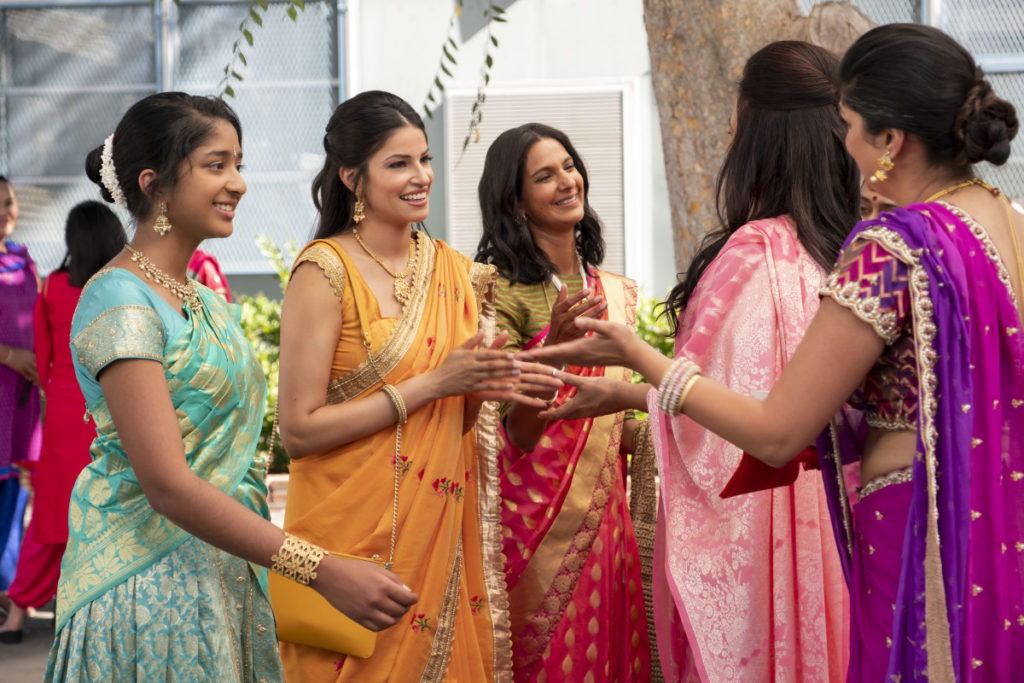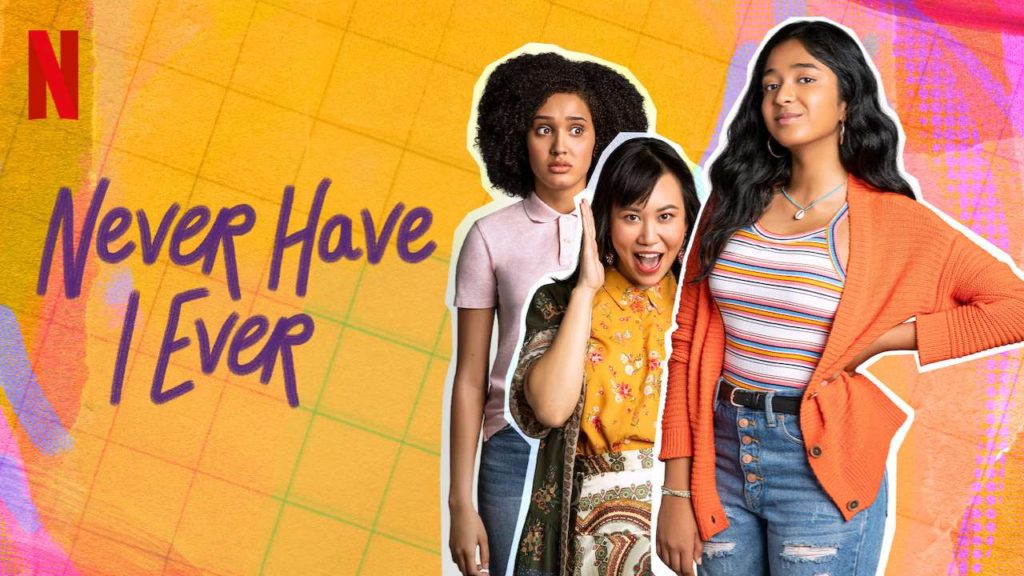When you’re a self-proclaimed TV aficionado, people often ask you if you’ve seen blank. But I’ve never had so many people ask about the same show in such quick succession before. Tuesday morning, I actually woke up to a text asking me if I’d seen Never Have I Ever. In fact, I finally started the show mostly because I wanted to stop answering “no” when people asked me about it.
If you haven’t heard of it yet, Never Have I Ever is Mindy Kaling’s new Netflix teen comedy about Devi (Maitreyi Ramakrishnan), an Indian-American teenager trying to navigate high school. To my knowledge, it’s the first teen comedy with a South Asian female protagonist.
Naturally, as a young Indian-American woman myself who watches a lot of TV, people wanted to know what I thought of the show.
What people don’t know, though, is that I have been anticipating the release of this series for more than a year.
the backstory
When I first heard Mindy Kaling was developing a semi-autobiographical teen comedy for Netflix, I was ecstatic. Though I had a complicated relationship with Kaling, I was mostly a fan of her show The Mindy Project, I looked up to her as an Indian woman in entertainment, and I wanted representation. I wanted a TV show that might actually show some of my experiences.
Around the time I learned the show was in development was when Mindy Kaling announced that they would be doing an open casting call for the three leads. So naturally, I decided to look into the audition process, just for the hell of it. I made an acting resume, emailed in a headshot, and got an email back with access to the sides (scenes).
I even read through the scene with my friends a couple of times, and I really could have sent in a tape. I could have thrown my hat in the ring with the 15,000 other submissions. Ultimately, I didn’t. Mainly because I knew I wouldn’t get the part—not even considering my acting abilities, I don’t look anything like a young Mindy Kaling. But also because the audition scene was TERRIBLE. My friend and I actually joked about rewriting the scene and sending it back in.
Then, over the summer, Kaling’s Four Weddings and a Funeral came out, and it was literally unwatchable. It had the vibe of a Hallmark movie. So needless to say, since then, I was extremely skeptical of Never Have I Ever. I wanted so desperately for the first major instance of representation for a South Asian girl to be good.
so, is the show any good?
Before I get into my assessment of the show, it’s worth noting that I think this show is meant for younger audiences—It’s not a teen comedy in the vein of Sex Education.
Anyway. I have to start by saying that this show can be incredibly cringey (they did rewrite the audition scene, though). The characters, particularly Devi and her friend Eleanor, are often super extra and just don’t talk like real humans. It often feels like adults trying to guess at what young people would say. Devi also very willingly puts herself in potentially embarrassing situations that can be…stressful… to watch (for example, in the first episode she talks to her crush like a stalker).
But despite this, the show excels when it delves into more emotional content. Devi lost her father unexpectedly to a heart attack 8 months prior, and she is very much struggling. The later episodes do an excellent job of exploring her grief and the complicated relationship she has with her mother, which she has been ignoring up to now. I cried at least 4 times while watching.
The show also features an extremely diverse cast, which is always a good thing in my book.
It sometimes relies on some pretty classic teen comedy tropes, but as the first teen comedy with a diverse cast and starring an Indian-American family, I think that’s fair. Ultimately, the best way to explain Never Have I Ever is this: though I cringed at certain lines while watching, the scenes and feelings that stayed with me after finishing the season were overwhelmingly good.
But what I’m really interested in is what Never Have I Ever means for that elusive thing called “representation.”
what even is representation?
“Representation matters.”
I agree, but what does that actually mean? And why does it matter?
It’s powerful to see characters that look like you onscreen. It expands the realm of possibilities for each individual, and it makes you feel seen and heard. I think it’s especially significant when minorities play the types of characters they’ve traditionally been excluded from, like superheroes or presidents.
But at the same time, isn’t the point of storytelling being able to relate to, or at least understand, people who don’t necessarily look like you? Don’t we want to be exposed to diverse storylines?
I think “representation” gets conflated with diversity. We shouldn’t just be clamoring for more stories about people who look like we do, we should be clamoring for more stories about and created by people who don’t. People who’ve never had their stories told.
Because I think we forget what we actually mean when we say “representation matters.” We forget that we want characters who look like our family members so that our entire ethnicity or race(whatever it is) feels like it’s part of pop culture. We want representation so the narrative that White is the default—the epitome of beauty—dies.
We certainly don’t want representation because we are incapable of relating to stories about people who don’t look like us, yet sometimes this is how it seems.
When we repeat to ourselves over and over “representation matters” without pausing to think about what representation actually means, we begin to expect that stories that do “represent us” will perfectly match up to our own experiences. At least, that’s what I find has happened to me.
Take my experience reading The Namesake, for example. Written by Jhumpa Lahiri, a UK-born Bengali woman who grew up in the US, I expected to find myself in its pages. I wanted so desperately to relate to art that was supposed to represent me because I felt that’s what was supposed to happen.
When the novel didn’t fit my experiences, I felt upset. Alienated, even. I was disappointed that I hadn’t found a magical connection to her books.
Reading a book or watching a show with characters that have a similar background to you doesn’t mean you will perfectly relate to it. Mindy Kaling can’t tell the story of every single South Asian woman in America because there is no one experience. And it is tremendous pressure both on the artist and the viewer to expect that she or anyone else can.
Still, the solution to this is not to take the urgency of representation less seriously. The reason this problem exists in the first place is the severe lack of representation. Take South Asian women, for example. There are so few instances of South Asian women in media (Hindu, Muslim, or otherwise), any time we get a little taste, we are literally desperate for it to validate our experiences. We long for this new TV show, or movie to reflect our lives.
But the parts of Never Have I Ever that I related to most weren’t about Devi’s Indianness—in fact, I have an extremely different relationship to my Indian identity than Devi does, and my Indian family members are also very different from hers. The parts I related to the most were the ones where she tried to deal with her grief.
striking a balance
When you are tasked with creating the first teen comedy about an Indian-American teenager, the stakes are high. It’s important to balance the universal aspects of the story—the things every teen goes through—with the aspects specific to Indian/South Asian culture–—the family functions, the cultural values. Never Have I Ever does a much better job of that than any other Mindy Kaling project I have seen.
And I think this balance is what representation is really about. People don’t just want stars that have the same skin tone as them, they want to see characters eat the food they grew up eating, celebrate the holidays they grew up celebrating.
For me, this is what I didn’t like about The Mindy Project. I felt as if she had taken up the mantle (be it willingly or unwillingly) of being the Indian-American woman in comedy, but her sitcom felt so removed from Indian culture. Her character felt Indian in name only. The show felt whitewashed.
On the one hand, based on exactly the points I articulated above, it’s unfair to judge her for this. There are many Indian-Americans who aren’t particularly connected to the left side of that hyphen. On the other, when you’re the most famous Indian woman writer in Hollywood, can you blame me for wishing for more from her?
Luckily, Never Have I Ever delivers. It also actually delves into how Devi feels about her heritage in episode 4 when Devi attends Ganesh Puja with her family. That episode marked when I started to feel the good outweighed the cringey.

Never Have I Ever is a teen comedy about an Indian-American protagonist, not a teen comedy whose protagonist happens to be Indian-American.
in conclusion
Can you see where all of this inevitably leads? I call representation a “double-edged sword” only because there is too little of it. When we only get a tiny taste, we expect too much.
We need more diverse stories. We need stories written by people of every religion, sexuality, ethnicity, and race, and we need different perspectives on each of these things. We need stories about people rejecting their heritage and ones about people embracing it.
No one should be expected to tell the story about the immigrant experience, or the first-generation experience, or the coming out experience. If representation exists, if diversity is the norm, no one will have to. We will be able to celebrate finding ourselves in stories where we expect to, and finding ourselves in stories where we never thought we would.
If you’re interested in reading more about this, I highly encourage you to check out Mindy Kaling’s interview in the New York Times. It severely influenced how I approached watching the series and the ideas explored in this essay.

This was such a good post! A really nuanced take on representation
Thank you!
Shalinee, this is such a strong piece of writing and I really enjoyed reading your perspective on this complicated issue!
Thank you!
What you say about the difference between representation and diversity is BRILLIANT. I think it’s really true that we just need MORE. I remember when Love, Simon came out and people were saying that he has such a good experience coming out and that wasn’t theirs, so, therefore, the movie was bad. I was frustrated because that certainly is SOME people’s experience! Just because his experience was a good one—and the majority of people’s are not—should not mean that people who do have good experiences should be discounted. We should be encouraging them, in fact! One singular title cannot represent every person’s experience. It’s a start, but we have a long way to go.
Exactly! We don’t need to tear down instances of representation to ask for more of it.
Well job shalinee
Great work Shalinee!
Thanks!